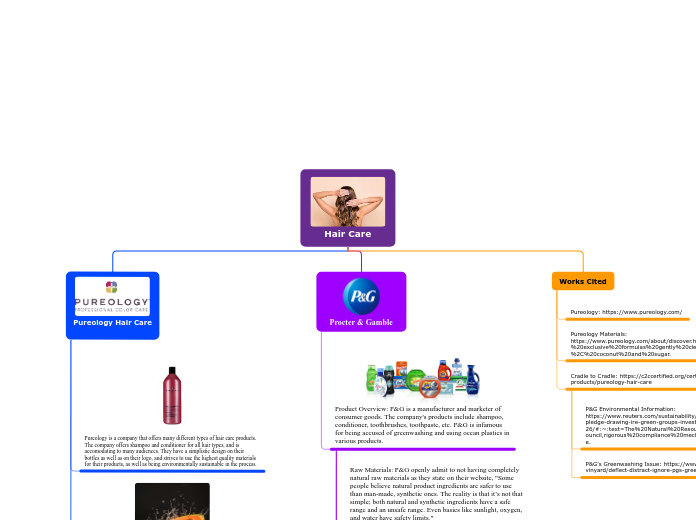av Justin Yang 1 år siden
145
Hair Care
A hair care brand, Pureology, emphasizes the use of natural and beneficial ingredients such as sunflower seed extract, UV filters, papaya extract, coconut, sugar, and Vitamin E in their products.

av Justin Yang 1 år siden
145

Mer som dette
From various shampoo bottle brands such as Head and Shoulders from different brands, out of the 91% of plastic that's thrown away, about 12% is burned, and 79% is tossed into landfills or the environment.
The price points of P&G products range from a high of $178, with a low of $156, with a median range of $167.
P&G also works to ensure that 100% of their paper packaging is either recycled content or 3rd party certified virgin fiber.
Venus is made with 30% recycled plastic and uses fully recyclable packaging. Moreover, the liquid-detergent bottle by our brand Ariel is recyclable. Further, the brands Ariel and Tide continue to be phosphate free.
P&G relies on virgin forest fiber, meaning they cut down century-old trees to make into tissues that will be used once and flushed away forever. Also, they have made no commitment to stop sourcing from primary forests. P&G’s entrenchment in unsustainable forest sourcing practices has been an ongoing cause of concern to the company’s shareholders.
The Procter & Gamble Manufacturing Company produces branded consumer products. The Company manufactures a wide variety of consumer goods including beauty and grooming supplies, household care items, soap, and detergents.
P &G products are also transported through cars, planes, trucks, etc., but the main problem with the company is due to its size, there are various warehouses for different products all in the same town. This means that if a customer purchases these two different products, the distributer will have to travel to both warehouses to pick up the products.
P&G comes up a few times as a greenwashing culprit for their use of ocean plastic in their Head & Shoulders' bottles, and for their refillable bottles. 420mL bottles require a 480ml refilling pouch, which covers just over a single refill per purchase. Shampoo bottles made of HPDE or PET plastic are widely recycled, but the unsustainable plastic of the pouch is not.
P&G admit to having dioxane as a byproduct of production, and to using phosphates, triclosan and triclocarban, phthalates, microbeads and microplastics.
Pureology offers their products online on their website, or in retail stores such as Walmart or Target. Pureology ensures that they deliver their products in the least environmentally harmful way, and by using biodegradable and recyclable materials for their packaging to houses and to retail stores. They also have mentioned that they use zero plastic for their packaging, which makes their environmental impact much stronger.
The price points for Pureology range from a price of $30 all the way to $66, with a median price point of $48.
Pureology is manufactured in the United States. As of now, Pureology does not ship internationally and is only being sold in the United States, thereby having a greater environmental footprint as travelling long distances isn't an issue with the company. Within the manufacturing site, workers are subject to fair working conditions, with pay ranging from $15-20/hr.
Pureology claims to combine all of their materials together, without any added harmful chemicals to their products, and is then shipped off with packaging that is made with 100% recyclable fibers. According to Cradle to Cradle, the product has been at least 95% assessed and they found no substances known to cause cancer or reproductive harm.